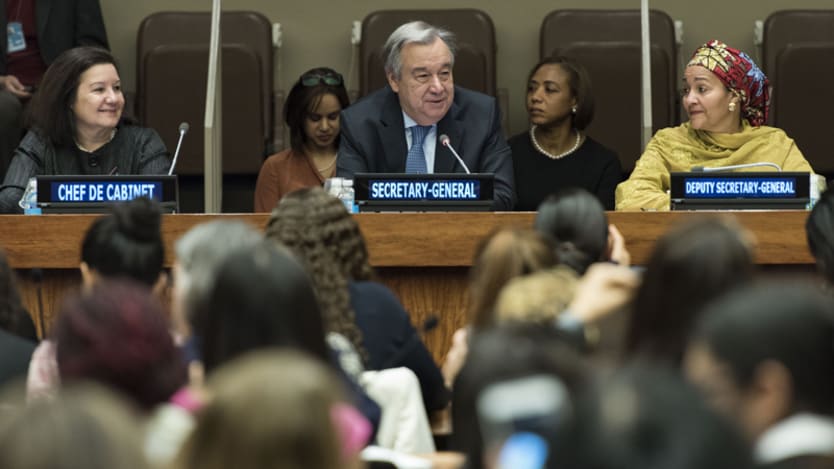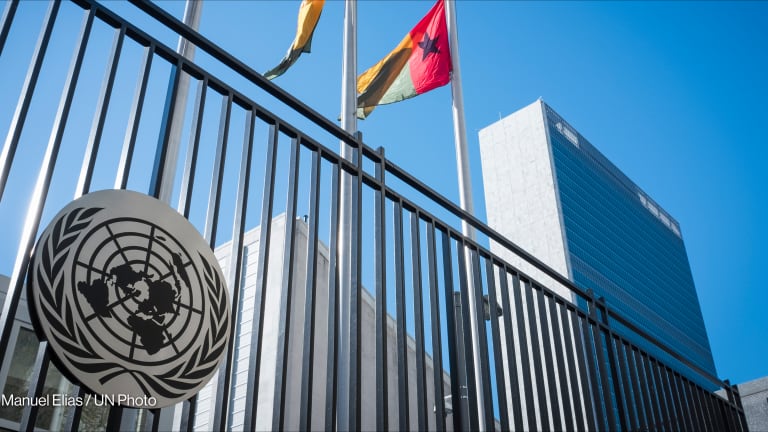
This week marks the 100th day since United Nations Secretary-General António Guterres took office. In this brief window of time, the new secretary-general has articulated several commitments to women’s rights and gender equality in the U.N. system and beyond.
This is likely, at least in part, due to public and private pressure. After all, the secretary-general took office at a time of unprecedented public and member state pressure for feminist leadership at the U.N. — the Group of Friends of Gender Parity (which started out the Group of Friends for a Female Secretary-General) now counts some 90 countries in its membership. There was a full-page ad in The New York Times taken out by leading women’s rights activists during the selection process, and campaigns such as the International Center for Research on Women and partners’ Feminist U.N. campaign have put forward a number of concrete actions the secretary-general should take to make urgently needed changes for women’s rights in the U.N. system and on the global stage.
This pressure appears to be working. The new secretary-general has made a number of commitments publicly, held numerous public and private meetings with women’s rights champions from New York to Cairo, and held the first-ever women’s rights town hall during the U.N.’s recent meetings of the Commission on the Status of Women. Indeed, the secretary-general seems to be courting the pressure: In a speech at the opening session of the 61st Commission on the Status of Women, Mr. Guterres invited civil society to hold the U.N. to account on these promises: “Do not let us in the U.N. off the hook. Keep our feet on the fire. Keep pushing. Keep inspiring. Keep making a difference.”
High marks for the first 100 days
So, how is the new secretary-general doing on women’s rights?
We’ve developed a report card for his first 100 days, and overall, he makes high marks. In the short space of his first 100 days, Guterres has made an unprecedented number of noteworthy statements in support of various women’s rights and feminist issues, an example that is unmatched by historical precedent. He has directly addressed many issues we outlined both in an expert briefing report we authored last fall and subsequent set of policy recommendations for his first 100 days in office.
The secretary-general receives the highest marks in articulating and implementing a feminist agenda, financing for gender equality, promoting the freedom of information with the U.N. system and utilizing feminist leadership by establishing gender parity in U.N. positions. He has taken several bold steps, including taking on the issue of violence against women in the U.N. system. He has also articulated support for a whistleblower policy.
Room to grow
In other arenas, while some progress has been made, there is still more room to grow. Guterres hasn’t said much specifically about how he will work to ensure that the Sustainable Development Goals have a strong accountability framework — for instance, a mechanism that would link it to the Commission on the Status of Women’s review process or allow for feminist civil society to engage in shadow reporting.
Secretary-General Guterres should also immediately update the zero-tolerance policy to include all forms of violence and discrimination — not only sexual violence and exploitation — and enforce it and other policies that protect individual whistleblowers and/or agencies that denounce unequal hiring and promotion practices, sexual harassment and gender discrimination broadly. The U.N. must also make better commitments to working with the U.N. Economic and Social Council, UN Women and civil society to reform CSW’s annual meetings, to protect space for civil society dialogue and defend against governments seeking to close that space.
While he has not addressed every issue championed by the Feminist U.N. campaign, Mr. Guterres has demonstrated clear commitment to breaking new ground on women’s rights in the U.N. system, as well as to championing gender equality on the global stage. This is a strong foundation upon which to build future progress, especially recognizing that the 100-day window of time better affords a symbolic stand than sufficient opportunity to implement transformative changes.
We congratulate the secretary-general on an unprecedented effort to date, and will be following his progress and updating this report card in the course of his first year and term of office.
Read more international development news online, and subscribe to The Development Newswire to receive the latest from the world’s leading donors and decision-makers — emailed to you free every business day.
Read more on gender equality at the United Nations:
►Top takeaways from the UN's largest women's rights gathering
►Tips for making gender-responsive budgets a reality
►UN celebrates International Women's Day with tough talk on equality in the workforce and at home
► All eyes are on Guterres as he appoints several women to top UN posts








